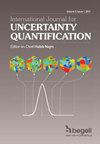SPARSE TENSOR PRODUCT APPROXIMATION FOR A CLASS OF GENERALIZED METHOD OF MOMENTS ESTIMATORS
IF 1.8
4区 工程技术
Q2 ENGINEERING, MULTIDISCIPLINARY
International Journal for Uncertainty Quantification
Pub Date : 2020-12-21
DOI:10.1615/int.j.uncertaintyquantification.2021037549
引用次数: 0
Abstract
Generalized Method of Moments (GMM) estimators in their various forms, including the popular Maximum Likelihood (ML) estimator, are frequently applied for the evaluation of complex econometric models with not analytically computable moment or likelihood functions. As the objective functions of GMMand ML-estimators themselves constitute the approximation of an integral, more precisely of the expected value over the real world data space, the question arises whether the approximation of the moment function and the simulation of the entire objective function can be combined. Motivated by the popular Probit and Mixed Logit models, we consider double integrals with a linking function which stems from the considered estimator, e.g. the logarithm for Maximum Likelihood, and apply a sparse tensor product quadrature to reduce the computational effort for the approximation of the combined integral. Given Hölder continuity of the linking function, we prove that this approach can improve the order of the convergence rate of the classical GMMand ML-estimator by a factor of two, even for integrands of low regularity or high dimensionality. This result is illustrated by numerical simulations of Mixed Logit and Multinomial Probit integrals which are estimated by MLand GMM-estimators, respectively.一类广义矩估计方法的稀疏张量积逼近
广义矩法(GMM)估计量的各种形式,包括流行的极大似然(ML)估计量,经常被用于评估具有不可解析计算矩函数或似然函数的复杂计量经济模型。由于gmv和ml估计器的目标函数本身构成了一个积分的近似值,更准确地说,是真实世界数据空间上的期望值的近似值,因此出现了一个问题,即力矩函数的近似值和整个目标函数的模拟是否可以结合起来。受流行的Probit和Mixed Logit模型的启发,我们考虑了由所考虑的估计量(例如最大似然的对数)产生的连接函数的二重积分,并应用稀疏张量积正交来减少组合积分近似的计算工作量。考虑到Hölder连接函数的连续性,我们证明了这种方法即使对于低正则性或高维的积分,也能将经典gmand ml估计的收敛速率的阶数提高2倍。这一结果通过MLand gmm估计器分别估计的混合Logit积分和多项Probit积分的数值模拟得到说明。
本文章由计算机程序翻译,如有差异,请以英文原文为准。
求助全文
约1分钟内获得全文
求助全文
来源期刊

International Journal for Uncertainty Quantification
ENGINEERING, MULTIDISCIPLINARY-MATHEMATICS, INTERDISCIPLINARY APPLICATIONS
CiteScore
3.60
自引率
5.90%
发文量
28
期刊介绍:
The International Journal for Uncertainty Quantification disseminates information of permanent interest in the areas of analysis, modeling, design and control of complex systems in the presence of uncertainty. The journal seeks to emphasize methods that cross stochastic analysis, statistical modeling and scientific computing. Systems of interest are governed by differential equations possibly with multiscale features. Topics of particular interest include representation of uncertainty, propagation of uncertainty across scales, resolving the curse of dimensionality, long-time integration for stochastic PDEs, data-driven approaches for constructing stochastic models, validation, verification and uncertainty quantification for predictive computational science, and visualization of uncertainty in high-dimensional spaces. Bayesian computation and machine learning techniques are also of interest for example in the context of stochastic multiscale systems, for model selection/classification, and decision making. Reports addressing the dynamic coupling of modern experiments and modeling approaches towards predictive science are particularly encouraged. Applications of uncertainty quantification in all areas of physical and biological sciences are appropriate.
 求助内容:
求助内容: 应助结果提醒方式:
应助结果提醒方式:


